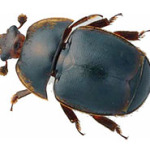Time to ban bee imports?

Small Hive Beetle
The West Sussex Beekeepers Association have proposed the following motion to the BBKA Annual Delegates Meeting (ADM) in January “Following the discovery of Small Hive Beetle, Aethina tumida, (SHB) in Italy in September 2014 this ADM instructs BBKA to urgently seek a ban on the importation of bees and unprocessed bee products into the U.K”. Further details can could be found in their newsletter (under the heading Jim’s Jottings, from the illogically named Jim Norfolk, Chairman of the West Sussex BKA). The full proposition from West Sussex BKA, the supporting notes and the response from the BBKA Executive Committee can be found here on the Beekeeping Forum. The Executive Committee of the BBKA does not support the proposition – as summarised in the sentence “At this point in time the Executive does not consider it appropriate to seek or it be possible to achieve a ban on the importation of honey bees and unprocessed honey bee products and does not support the proposition“.
There is little justification explaining why the BBKA Executive Committee do not consider it appropriate to seek a ban on imports. As explained in a recent post, the National Bee Unit have conducted a risk assessment (in 2009) which concluded that “The pathway likely to present the greatest risk of introduction [of SHB] was the movement and importation of honey bees”.
Time is short … discuss this with your association
Please discuss the potential introduction of SHB and how it might be prevented with your own local association. If you feel strongly about it persuade your delegate at the January BBKA ADM to support the motion proposed by the West Sussex BKA. Remember that the UK imports thousands of queens and bees from Europe every year, many are from Italy, but others are from countries like France that also import thousands of queens and bees from Italy. Do you know where the nuc you or enthusiastic beginners purchased in April/May originated from?
The precautionary principle
The precautionary principle is that there “is a social responsibility to protect the [public or environment] from exposure to harm, when scientific investigation has found a plausible risk. These protections can be relaxed only if further scientific findings emerge that provide sound evidence that no harm will result“. There is a plausible risk of SHB entering the UK during the importation of bees. Until evidence is provided to the contrary – presumably by the BBKA and others who do not support a ban on bee imports – the precautionary principle should be applied.
The Native Irish Honey Bee Society has “calling for an immediate ban on imports of honey bees on animal health protection grounds“. Malta has already banned imports from Southern Italy. The Local Association Secretaries of the SBA have discussed the threat of SHB where there was considerable support for the following proposition “The SBA urges that all possible measures are taken to prevent the introduction of small hive beetle into the UK. These should include a cessation of trade in live bees from the rest of Europe for 2015 until the true spread of the pest is better known“. The Welsh BKA are discussing the issue shortly.
Eradication after arrival …
With the exception of the introduction of SHB to Portugal in 2004, no country has managed to eradicate the beetle after it has been introduced. In Portugal the beetle was introduced as larvae with a single shipment of queens (illegally) imported from Texas to a single apiary. All colonies in the apiary were destroyed and the ground was ploughed up and soaked in insecticide. Rather than rely on the contingency plans and sentinel apiaries in the UK to detect the beetle after arrival we should use the age-old doctrine of prevention being better than cure … we should do our best to stop the beetle getting here in the first place.
Other benefits of a ban on imports
Decreased reliance on imported bees and queens is likely to significantly benefit UK beekeeping in the long run. We may have to alter the way we train beginners, we might have to do a lot more autumn requeening, we might have to improve our integrated pest management, we will have to increase local queen rearing activities … however, none of these are insurmountable problems and all are likely to improve the quality of UK beekeeping. Bees and queens might become more expensive, but only until local association queen and nuc rearing activities have geared up to cope with the additional demand. I would think that any increase would be insignificant if compared to the cost of lost colonies should SHB arrive and become established in the UK. I accept that there might be issues for commercial beekeepers, but am unconvinced that a business model that relies upon cheap imports is sustainable in the long-term.
Further details on the biology of Small Hive Beetle can be found in in a recent paper by Morgan Roth and colleagues.
Join the discussion ...